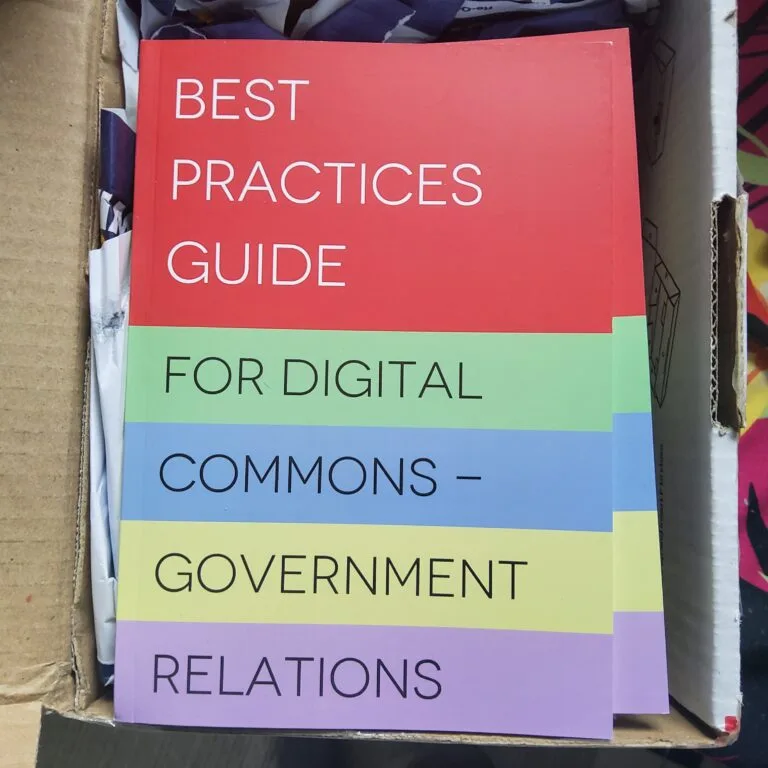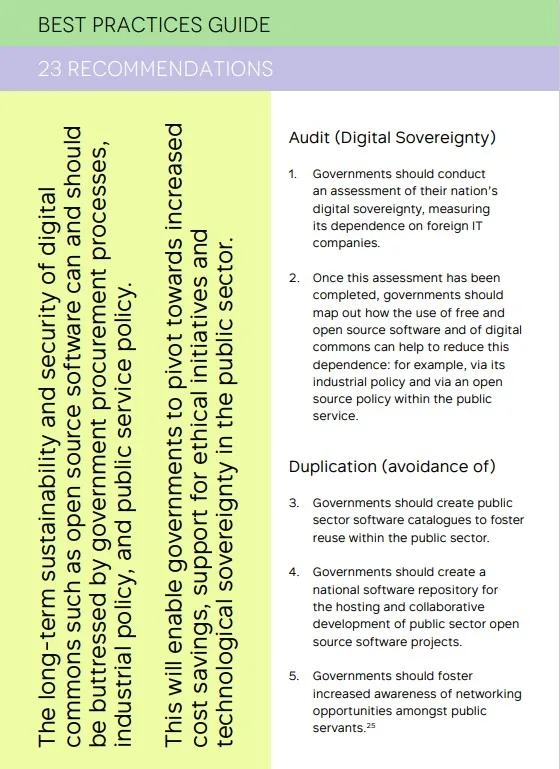
What are the digital commons and how can they be supported and promoted in government policy?
In order to implement technology for social good, we need to understand how technologies fit within the social order, the values they embody and who has the power and ability to improve them. One major player in this scenario is the public sector - such as the national, devolved, and local governments in the UK - which through their procurement processes, industrial policies, and public service policies can support and incentivise technologies for social good, starting with the software they themselves buy and use.
Currently much of that software comes from ‘Big Tech’ companies such as Microsoft, Google and Amazon, all headquartered in the US, but these are not the only options. The digital commons presents a cheaper and more ethical alternative, as we propose in the Best Practices Guide for Digital Commons-Government Relations we published recently with the Digital Commons Policy Council (DCPC). DCPC is an international think tank which aims to increase the recognition of the benefits of digital commons and of the volunteer labour which produces these common goods.
Digital commons are community-developed resources such as software, data, information, culture and knowledge which are created, shared and maintained by communities. Examples include free and open source software (FOSS) and open content and data resources such as Wikipedia and Wikidata, which can be used by anyone without needing to seek the permission of intellectual property owners, unlike ‘proprietary’ alternatives. While much of the digital commons is more technical, such as software, the arts and culture sector makes important contributions to the commons too, especially as regards to free culture and knowledge, with Creative Commons licensed content (such as images, literature and music) being an example of the former and Wikipedia being an example of the latter.
As we identify in the Best Practices Guide, digital commons have a number of advantages over their proprietary rivals. If used by governments, they can save the public purse money and improve national sovereignty by reducing dependence on Big Tech. The open and transparent nature of digital commons can also help restore public trust in government technology, as the experience of open and closed COVID apps, including in the UK, demonstrated. The use of digital commons can furthermore increase the public’s democratic participation and access to data.
Governments can assume an important role in adopting digital commons solutions in the public sector, and support the digital commons more widely through industrial policies, as France and Germany have done. However, such connections between governments and digital commons projects are not well known, or documented.
To remedy this, on 30-31 May 2024 the DCPC-CIS 2024 Policy Lab was held in Paris at the Centre Internet et Société (CIS) of the French National Center for Scientific Research (Centre National de la Recherche Scientifique, CNRS). The event brought together thirty digital commons experts from Australia, Belgium, France, Germany, Italy, the Netherlands, Norway, Sweden and the UK. They included representatives from academia, civil society organisations, digital commons communities and projects and public sector organisations. A key Policy Lab output is the Best Practices Guide for Digital Commons – Government Relations which aims to provide interested policymakers and public service officials with best practices to support digital commons projects. Our guide draws on existing cases of government-digital commons interactions, points out where improvements can be made, and provides interested policymakers and officials with best practices for supporting digital commons projects.
Image: Page 16, first page of the guide's recommendations

We have devised 23 recommendations for governments, across procurement processes, industrial policy and public service policy. Some of these are somewhat technical and technocratic whilst other recommendations are relevant from an arts and culture perspective, as digital commons’ success and support is not just a question of software and hardware, but have broader societal implications, which require interdisciplinary and practical approaches. Key points include:
- Governments need to include knowledge of digital commons, especially FOSS, as part of education policy. A key aspect of this will be in technical skills for future developers, but these are not enough. Education policy for the digital commons also needs to include interpersonal skills for effective and inclusive communication and ethics, notably sharing, transparency and openness. Arts and cultural perspectives can play an important part in shaping these interpersonal and ethical skills.
- Drawing on Strasser et al (2022), funding bodies supporting open source should stipulate rules for funding recipients, including embedding EDI throughout the project, and recognise non-technical contributions (e.g., documentation) as well as technical ones.
- Governments need to adopt clear communication to build public trust in digital commons solutions, especially during public emergencies such as the COVID-19 pandemic. While the Guide does not specify what this communication would look like, it could (and perhaps should) involve creative and engaging ways of disseminating information about the digital commons to the general public.
As an interdisciplinary group of scholars from the humanities, arts, social sciences and computer science, we strongly believe that the digital commons and policies to support them need to draw on more than technical perspectives, and that successful acceptance and promotion of technical solutions requires adopting a richly diverse set of methods to engage with wider publics.
Click here to read and download the guide.
Authors:
Angela Daly - Professor of Law and Technology, University of Dundee
Gary Leeming - Director, Liverpool Civic Data Cooperative, University of Liverpool
Riccardo Nanni - Researcher in Data Governance, Fondazione Bruno Kessler (Italy)
Mathieu O'Neil - Professor of Communication, University of Canberra (Australia)
Top Image: Front cover of Best Practices Guide for Digital Commons-Government Relations guide
Middle Image: Page 16, first page of the guide's recommendations
